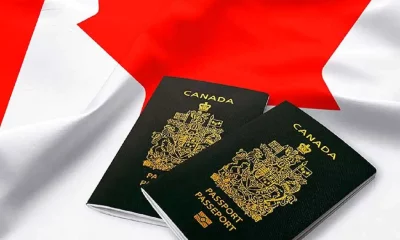Career
How to Secure Accommodation in Canada as an Immigrant
One of the primary concerns for newcomers to Canada is securing accommodation, which is often one of the first questions asked by students and employees upon their arrival. This is because having a place to live is a basic necessity that must be addressed before other needs can be met during the initial weeks in Canada. It is advisable to plan ahead and familiarize oneself with the housing options and procedures, especially if there are no relatives or close family members available to provide temporary housing. Depending on one’s income and family size, there are short-term and long-term housing options available in Canada.
Prior to your departure for Canada, it is recommended that you begin making arrangements for your accommodation. In the event that you have not secured a permanent apartment, it is advisable to have a list of organizations that offer temporary accommodation for newcomers, or a list of preferred hotels to stay in upon your arrival. This will help to streamline your relocation process and make it more manageable.
Delaying the process of arranging your accommodation can result in unnecessary stress and may lead to unforeseen expenses or the possibility of being taken advantage of by unscrupulous agents. This article aims to provide essential information on the different aspects of accommodation for immigrants in Canada to assist you in making informed decisions.
General Housing in Canada
In Canada, the most common types of housing are detached houses, semi-detached houses, and townhouses. Condominiums, commonly known as “condos,” are also popular, especially among single immigrants with a moderate budget for accommodation. Condos are relatively affordable and hassle-free, as maintenance tasks such as snow removal are typically handled by hired staff. This means that immigrants do not need to worry about taking time out of their settling-in process to make repairs. In addition, there are rental apartments available that range from one to three-bedroom units, as well as bachelor units for single occupants.
The Canadian Mortgage and Housing Corporation (CMHC) oversees the housing sector in Canada, and their website is a valuable resource for information on home buying, renting, and the mortgage process.
If you need temporary accommodation while waiting for your rental or purchase to be finalized, staying at a hotel is a viable option for your first few days in Canada. Hotels catering to newcomers are typically easy to locate, with many providing detailed information on their location, services, and pricing on their websites.
Non-profit or for-profit organizations that provide temporary housing at affordable rates are additional accommodation options available to newcomers in Canada. Immigrant-serving organizations in the area where you plan to reside can provide helpful information on such organizations.
Housing Guide for Newcomers
As a newcomer to Canada, you may find the procedures and requirements for securing an apartment a bit unfamiliar. However, these processes are designed to ensure that you have a positive experience while staying in your new home. Landlords or housing agencies will typically request that you provide the following documentation before being granted an apartment:
Proof of income, such as pay stubs or other relevant documents
Bank statements that demonstrate your ability to pay rent for the initial few months.
A reference letter from a prior landlord that attests to your reliability as a tenant is sometimes requested. However, this requirement may be waived for newcomers who do not have such a letter.
Having a bank statement that demonstrates your ability to pay rent for the initial few months is crucial, even if you are currently unemployed or a student. Landlords are typically hesitant to lease property to tenants who cannot prove they have the financial means to meet rent obligations. A deposit equivalent to half a month’s rent is frequently required as the initial payment for an apartment, although this may vary.
Rent fees for apartments usually commence on the first day of the month, and landlords and agents are typically more willing to lease property around that time. However, rentals may still be available until the middle of the month. Considering this, the best time to arrive in Canada is typically from the middle of the month to a week before the end of the month. This way, you can stay in temporary accommodation for a week or two while looking for a suitable apartment that you can begin paying for from the following month. Depending on the location within Canada, rental costs can range from several hundred dollars per month for a room to over a thousand dollars for a complete apartment.
Temporary Accommodations
If you have not secured a permanent apartment yet, temporary accommodations can be a lifesaver. These lodgings are typically not fully furnished for comfort, especially those with lower rates. Nevertheless, they will provide you with a roof over your head until you find the best-suited apartment for your needs.
If you find yourself in need of temporary accommodation, there are several options to consider. One of the easiest ways is to book a hotel room online, where you can check available room options and facilities provided before booking. If you are traveling with family, a suite may be more appropriate. It is important to research the hotel beforehand to know what to expect. Another option is to use Airbnb, which can be a reliable and affordable choice.
Certain organizations also provide temporary lodging for newcomers, and staying with family or friends already living in Canada is another possibility. It is advisable to contact your local Immigrant Settlement Agency upon arrival in Canada to explore the available temporary lodging options in your area. Keep in mind that temporary accommodations may not always be fully furnished, but they will provide a roof over your head until you find a permanent place to stay.
Finding Accommodation
Looking for an apartment in Canada can be daunting, and it’s important to know where to look, who to talk to, and how to avoid scams. A good starting point is to run a background check on apartments advertised in local newspapers or on websites such as RentHello and RentFaster. These websites are trusted and provide information on available apartments based on location, preference, family size, and budget. Other sites such as Craigslist and Kijiji are also reliable sources of information.
It is important to avoid renting a house before you arrive in Canada, unless you have friends or trusted agents who can do it for you to prevent scams. While staying in temporary accommodations, you can begin an active search for an apartment by checking for “to let” signs in your neighborhood. If you’re on a tight budget, consider renting houses on the outskirts of urban centers instead of in the city center. Don’t forget to factor in transportation costs and proximity to your place of work or school before settling on a location.
Always ask your landlord whether utility costs such as electricity bills are included in the rent so that you can make an informed decision about whether the apartment is worth the price. Most apartments come furnished, but it’s still important to check the place thoroughly to see how sparsely or heavily furnished it is and what additional furnishings you may need. You can find cheap housing furnishings on Craigslist, and towards the end of the month, many people moving out of apartments may sell furnishings at discounted rates.
Long Term Apartment Options
There are three ways to obtain an apartment in Canada:
- Subletting: Landlords may offer this option if they need someone to occupy their apartment while they are away for a short period. The duration of stay can range from months to a few years, and the tenant is expected to vacate the apartment once the owner returns. Typically, furnishings are left behind in the apartment, making it a cost-effective option for tenants who don’t want to spend much on furnishing a temporary home.
- Renting: This is the most common option for newcomers to Canada. Most aspects of renting an apartment have been previously discussed, but it’s recommended that you reach out to locals in the area to learn about the tenancy rights in the neighborhood. This will help you avoid being taken advantage of by landlords.
- Ownership: This may not be the best option when first arriving in Canada, but if you are considering permanent residency and have a family, owning a home may be a consideration in the long run. Before buying a house, ensure that you are familiar with all the details required, including property taxes. This will help you avoid penalties for non-compliance.
Student Accommodation in Canada
For international students in Canada, there are two options for housing: on-campus or off-campus. If you choose to live off-campus, you can use the tips provided earlier in this article to find suitable accommodation. However, on-campus housing is often more convenient and less demanding for students.
It is recommended to prepare your accommodation plans in advance to avoid the stress of finding a suitable place after arriving in Canada. Re-reading this article multiple times can help you become familiar with the accommodation process and find the best solution for securing your housing. Best of luck!
















